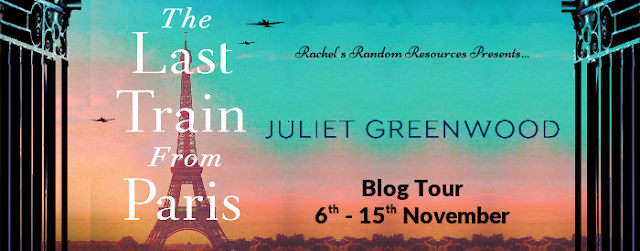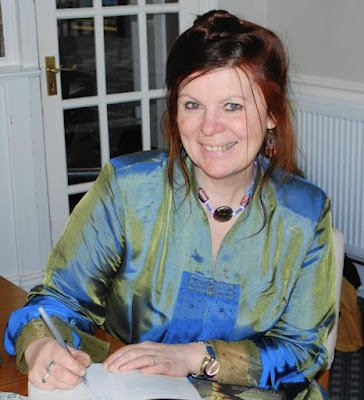I'm thrilled to invite Juliet Greenwood to my blog today. Juliet talks about the inspiration behind her historical novel, set in Paris during WWII. Scroll down to read the fascinating story of Juliet's Mum.
I'm adding this book to my must-read list. If I haven't had too many book blogging commitments this month, I would have loved to read this novel, especially that I've just stayed in Paris for several days.
The Last Train from Paris
What readers are saying about Juliet
Greenwood:
“This was fantastic! Perfect for a Kate Morton
or Lucinda Riley hangover, this book will draw you in and won't let
go until you've read the last page. This book
was unputdownable – fascinating
characters, excellent writing, and a plot that keeps you turning the pages. I
loved every second of it." Reader review, ⭐⭐⭐⭐⭐
“I found myself reading chapter after chapter,
unable to put it down. A first-time read by this author but
certainly not the last.” Reader review, ⭐⭐⭐⭐⭐
“For readers of Kate Morton and Lucinda Riley, this book will be one of your
favorites… A historical novel that will keep
you reading until the end.” Reader review, ⭐⭐⭐⭐⭐
“An absolutely brilliant read. I
could not put it down…I loved how the war changed everyone and it was a
gripping story... I really loved it. Cannot recommend
it enough.” Reader review, ⭐⭐⭐⭐⭐
“Did everything that I was looking for… it left
me wanting to read more from Juliet Greenwood.” Reader review, ⭐⭐⭐⭐⭐
Purchase Link - https://geni.us/290-al-aut-am
Author
Bio –
Juliet Greenwood is a historical novelist, now
published by Storm Publishing. Her
first novel was a finalist for The People’s Book Prize and two of her
books reached the top 5 in the UK Kindle store. Juliet has always been a
bookworm and a storyteller, writing her first novel (a sweeping historical
epic) at the age of ten. She lives in a traditional cottage in Snowdonia, North
Wales, set between the mountains and the sea, with an overgrown garden (good
for insects!) and a surprisingly successful grapevine.
Social
Media Links –
Storm: https://stormpublishing.co/
Website: http://www.julietgreenwood.co.uk/
Facebook: https://www.facebook.com/juliet.greenwood
Twitter: https://twitter.com/julietgreenwood
Instagram: https://www.instagram.com/julietgreenwood/
Guest Post by
Juliet Greenwood
My inspiration for The Last Train
from Paris
The inspiration
for The Last Train from Paris originated in so many memories of my
childhood in the 1960s and 70s. Most were impressions of my parents’
generation, the sense of something underlying their ordinary, everyday lives
that I didn’t understand, and, to be honest, wasn’t particularly interested. My
world was the future, with the optimism and sense of increasing prosperity of
those years. It was when my parents acquired a fridge to replace the pantry, a
washing machine superseded the twin tub and the mangle on the draining board,
and we eventually had a TV – black and white, of course - although some of the
neighbours had the wonder of colour. The NHS was still a miracle. The Second
World War was twenty years ago, which is lost in the mists of time when you are
ten.
It was only years later that I began
to understand (some of it only recently), that what lay underneath the adults’
lives was a memory of fear and a sense that life really could change in an
instant and nothing was certain. It’s something we haven’t really experienced
since, at least not until Covid hit. All through that surreal and frightening
time of the pandemic, when everything was turned upside down and our lives were
suddenly controlled by rules and constrictions we followed to help us all
survive, those memories of my childhood surfaced.
I
remembered how conversations between the adults had always seemed to stray back
to the war, to my dad seeing the barrage balloons going up over London, my mum
making her way through bombed out Birmingham to study, and standing in the
garden watching the glow that lit up the night as Coventry burned. Then there
were my teachers who were refugees, who had lived through the nightmare of
Europe descending into total war, who had survived the firestorm that engulfed Hamburg,
and the inhuman nightmare of concentration camps.
The films of my childhood about the
war mostly followed the heroics of battles, retelling the major conflicts on
land and sea and in the air. My mum always refused to watch them. At the time,
that all fitted in with women being viewed as weak, and rather silly, confined
mostly to the domestic sphere, with very little public appearance at all. It
was taking my permitted walks during Covid through almost deserted streets and
countryside, hungry to meet other dogwalkers to have some human contact, that I
remembered most vividly the stories Mum told me of having been a 17 year old studying
near Paris on the day war broke out and having to make her way back to Calais
by train, to catch the last civilian ferry back to Dover, which was stalked by
a German submarine in the middle of the Channel.
It
was then that it struck me that she had seen a side of war that, until
recently, hasn’t often been portrayed. The experiences of the civilians, not as
victims, but survivors. And in particular the women who kept lives together
under the most horrendous of circumstances, responsible for feeding families,
keeping them safe, keeping some kind of sanity and humanity, and surviving to
build a future after it was over. That was what my mum had seen as a teenager,
as she watched families saying goodbye on the stations as her train made its
way from Paris, families remembering a previous conflict and knowing they were
facing the horrors of occupation and total war. It was also the terror of
imminent extinction she experienced as she sat in the silent ferry as the
submarine sought for any sound that might betray its presence.
It was thinking over those memories,
and especially after we had found my parents’ letters to each other while Mum
was in France, and the note she sent when she finally landed in Dover, that
made me passionately want to tell the stories of the civilians making their
choices as best they could, and surviving by working together and sharing their
humanity as the unthinkable overtook their lives.
Above all, I wanted it to be a story of the strength and resilience of so-called ‘ordinary’ people, and the extraordinary way we pull together in times of crisis, whatever we are facing, be it war, a pandemic, or the many difficulties and tragedies of family life. I suppose, in the end, it’s about the power of love, and the way it pulls us through, whatever happens, and in hope of building a better future.




No comments:
Post a Comment